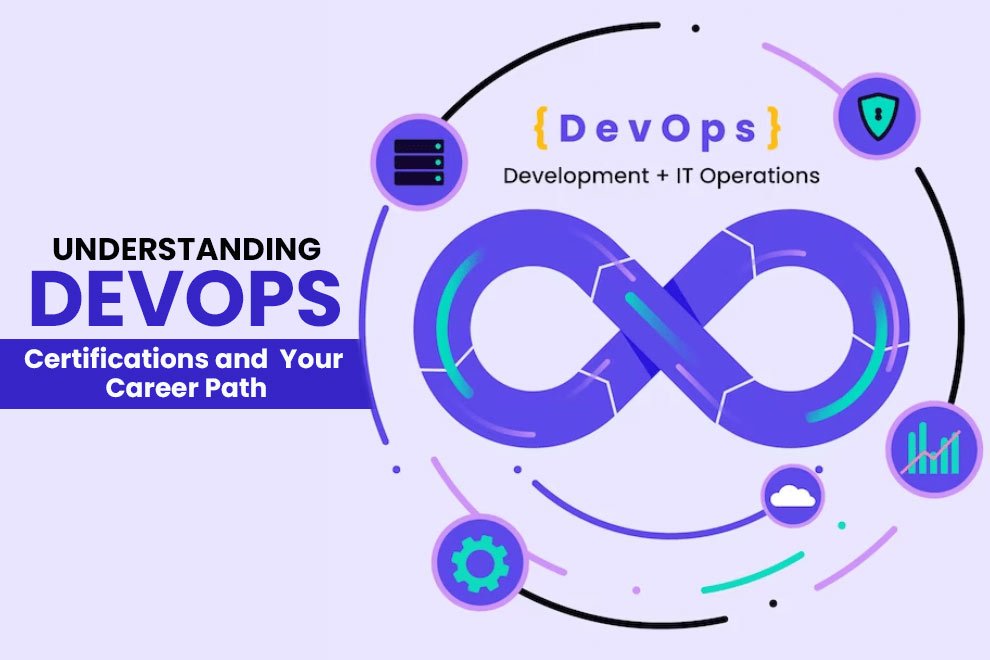The software development landscape is a whirlwind of innovation. Developers are constantly pushing boundaries, crafting sophisticated applications that improve our lives in countless ways. But getting those applications from concept to user can be a complex journey. Traditionally, development and operations teams functioned in silos, leading to bottlenecks and inefficiencies. Enter DevOps – a revolutionary approach that bridges this gap.
DevOps fosters a culture of collaboration and automation, streamlining the entire software development lifecycle (SDLC) – from ideation and development to deployment, monitoring, and maintenance. DevOps engineers play a pivotal role in this collaboration, ensuring smooth communication, seamless integration, and continuous delivery of applications.
If you’re intrigued by the idea of working at the heart of this dynamic field, a DevOps certification can be a valuable stepping stone for your career. But with a vast array of certifications available, choosing the right one can feel daunting. This comprehensive guide will equip you with the knowledge to navigate the world of DevOps certifications and chart your ideal career path.
Why Pursue a DevOps Certification?
While experience is invaluable, formal education in DevOps provides a solid foundation in core principles and best practices. Here’s why taking a DevOps certification course can be a game-changer:
- Validate Your Skills: Earning a recognized DevOps certification demonstrates your proficiency in DevOps methodologies to potential employers. It can give you a competitive edge in the job market, especially for entry-level positions.
- Enhanced Credibility: A DevOps certification enhances your credibility within the IT industry, showcasing your commitment to continuous learning and professional development.
- Career Advancement: DevOps certifications can open doors to career advancement opportunities within your current organization or new positions in other companies seeking skilled DevOps professionals.
- Industry Recognition: Many DevOps certifications are aligned with industry standards and best practices, ensuring you learn relevant and up-to-date skills.
Choosing the Right DevOps Certification for You:
Before diving into specific certifications, consider your individual goals and career aspirations. Here are some key questions to ask yourself:
- Your Career Goals: Are you aiming for an entry-level DevOps engineer position, seeking to enhance your current developer or operations skillset, or looking to specialize in a specific area of DevOps like continuous integration and continuous delivery (CI/CD)?
- Prior Experience: Consider your existing knowledge base. Some certifications cater to beginners, while others require foundational DevOps experience.
- Time Commitment: How much time can you realistically dedicate to preparation for the certification exam? Consider your schedule and workload.
- Learning Style: Do you prefer instructor-led learning, self-paced online preparation, or a blended approach?
- Budget: Factor in the cost of the certification exam and any training materials or practice tests you may need.
Popular DevOps Certification Options:
The DevOps certification landscape offers a variety of options to cater to different experience levels and career goals:
- Entry-Level DevOps Certifications:
- CompTIA IT Operations Specialist (CompTIA+ with Server+): This foundational certification lays the groundwork for your DevOps journey. It validates your understanding of core IT infrastructure concepts and practices, equipping you with the essential knowledge to begin exploring DevOps principles.
- AWS Certified Cloud Practitioner: This beginner-friendly certification from Amazon Web Services (AWS) introduces you to the basics of cloud computing and AWS services. It’s a good option for those interested in DevOps within the AWS cloud environment.
- Intermediate-Level DevOps Certifications:
- Certified Kubernetes Administrator (CKA): Kubernetes is a container orchestration platform gaining rapid adoption in the DevOps world. Earning the CKA certification demonstrates your expertise in deploying and managing containerized applications using Kubernetes.
- Microsoft Certified DevOps Engineer Expert: This certification from Microsoft validates your ability to implement DevOps practices and tools within the Microsoft Azure cloud platform. It’s ideal for those with experience in Azure and looking to specialize in DevOps within that environment.
- Advanced-Level DevOps Certifications:
- Professional Certificate in DevOps from edX: Offered by the Linux Foundation, this professional certificate program provides a comprehensive understanding of core DevOps principles, tools, and methodologies. It’s suitable for individuals with some prior DevOps experience looking to deepen their knowledge.
- Caltech – DevOps for Software Professionals Specialization on Coursera: This Coursera specialization offered by Caltech delves into advanced DevOps topics like containerization, infrastructure as code (IaC), and continuous delivery pipelines. It’s ideal for experienced software professionals or developers seeking to transition into DevOps engineering roles.
Exploring Course Examples: Focus on Real-World Application
While certifications are valuable, the true test of your DevOps knowledge lies in practical application. Let’s delve into two popular DevOps training programs that emphasize real-world implementation:
- A Cloud Guru – Certified Kubernetes Administrator (CKA) with Practice Exams: This comprehensive course from A Cloud Guru prepares you for the CKA certification exam. It goes beyond theoretical lectures, incorporating hands-on labs where you gain practical experience deploying and managing containerized applications using Kubernetes in a simulated environment. The course also includes practice exams to test your understanding and identify areas for improvement before taking the actual CKA exam.
- Linux Foundation – Professional Certificate in DevOps on edX: This edX program goes beyond theoretical knowledge, incorporating real-world projects into the curriculum. Students gain practical experience by working on projects that mimic real-world DevOps scenarios. These projects might involve building a continuous integration/continuous delivery (CI/CD) pipeline to automate the software delivery process or deploying an application to a cloud platform using infrastructure as code (IaC) tools.
Is a DevOps Certification Right for You?
Ultimately, the decision to pursue a DevOps certification depends on your individual learning style, career goals, and budget. Here are some additional factors to consider:
- Your Learning Preferences: Do you thrive in a structured learning environment or prefer the flexibility of online learning?
- Time Availability: Consider your schedule and how much time you can realistically dedicate to preparation.
- Financial Investment: Factor in the cost of the certification exam, training materials, and practice tests.
Building Your DevOps Skillset Beyond Certification:
A DevOps certification equips you with valuable knowledge, but remember, it’s just the beginning of your learning journey. Here are some additional steps to solidify your DevOps skillset:
- Develop Automation Skills: Automation is a cornerstone of DevOps. Learn scripting languages like Python or Bash and familiarize yourself with automation tools like Ansible or Puppet to automate repetitive tasks within the software delivery pipeline.
- Master Configuration Management: Tools like Chef or Ansible allow you to manage and maintain infrastructure configurations consistently across different environments. Gaining proficiency in these tools equips you to manage infrastructure efficiently and eliminate configuration drift.
- Embrace a Continuous Learning Mindset: The DevOps landscape is constantly evolving. Stay up-to-date with industry trends by following DevOps blogs and publications, attending webinars, and participating in online communities like the DevOps subreddit or the DevOps Stack Exchange.
Understanding Career Paths in DevOps:
DevOps offers diverse career paths. Here are some examples:
- DevOps Engineer: Performs core DevOps tasks, including building CI/CD pipelines, automating infrastructure provisioning, and collaborating with developers and operations teams.
- Site Reliability Engineer (SRE): Focuses on ensuring the reliability, scalability, and performance of applications in production.
- Cloud DevOps Engineer: Specializes in deploying and managing applications within cloud environments like AWS, Azure, or GCP.
- DevSecOps Engineer: Integrates security best practices into the DevOps lifecycle, ensuring secure software development and deployment.
Salary Trends in DevOps:
According to Indeed, the average base salary for a DevOps engineer in the United States is $108,342. However, salaries can vary depending on experience, location, industry, and specific skillset. Earning a reputable DevOps certification and continuously developing your skills can potentially boost your earning potential in the long run.
The Future of DevOps:
DevOps is no longer an emerging trend; it’s a core philosophy within the software development landscape. As organizations increasingly embrace cloud computing, containerization, and automation, the demand for skilled DevOps professionals is expected to continue its upward trajectory. By taking action on the information and resources available now, you can position yourself to capitalize on this exciting trend and contribute to the future of DevOps.
Ready to Launch Your Rewarding DevOps Career?
The world of DevOps offers a dynamic and challenging career path for individuals who enjoy working collaboratively, solving complex problems, and driving innovation in the software development process. A DevOps certification can be the perfect springboard to launch your DevOps career. By carefully considering your goals, exploring the available certifications and training options, and actively developing your skills, you can pave the way for a successful and rewarding future in the exciting world of DevOps!
Also Read: Tips To Choose The Best DevOps Course










